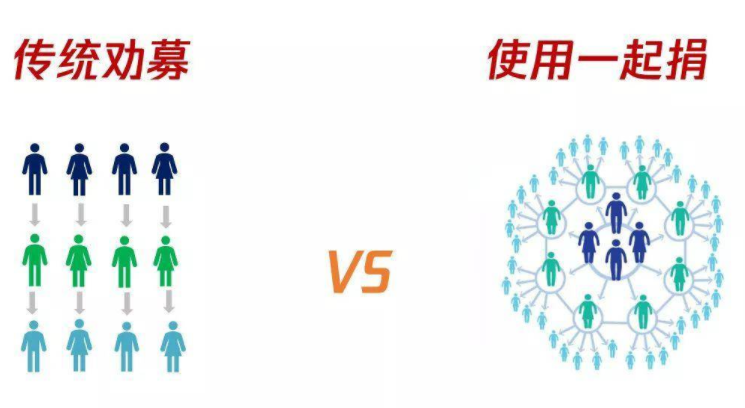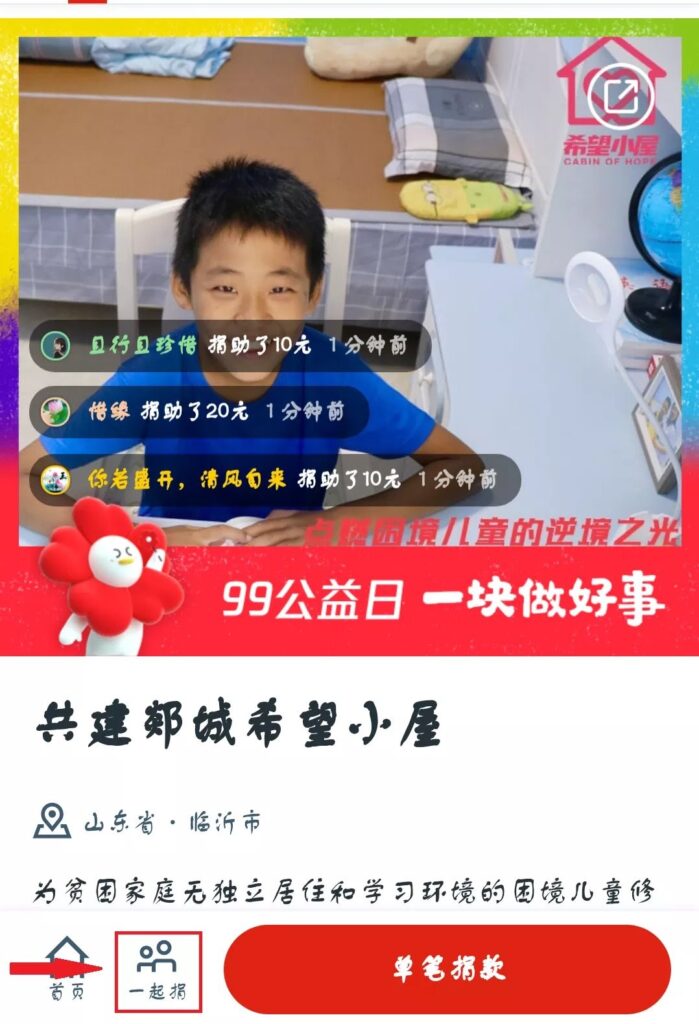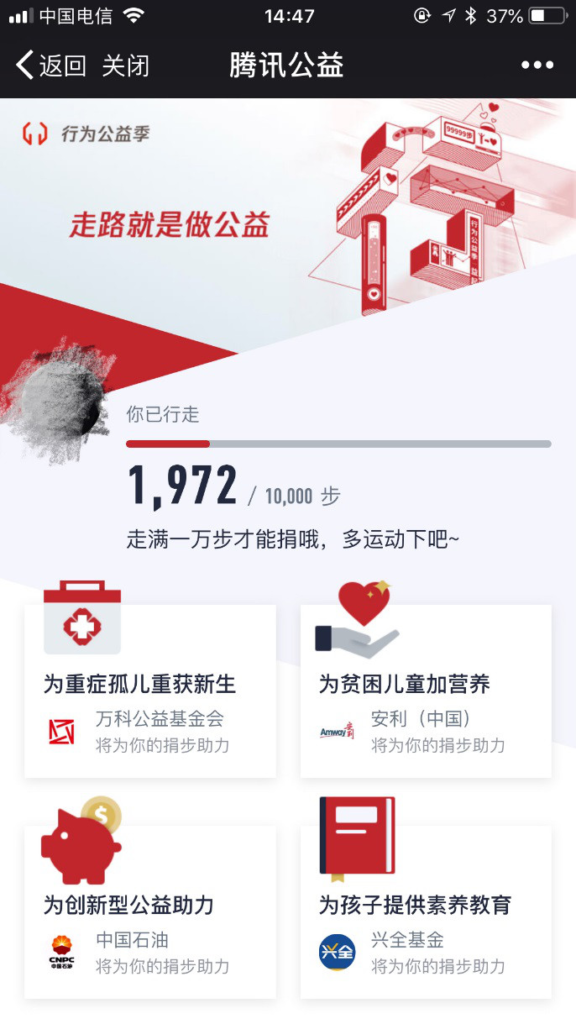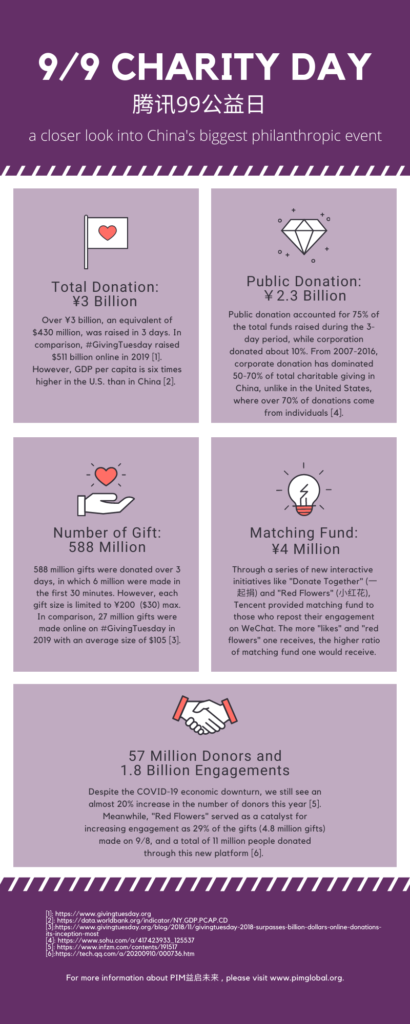On September 9, teachers, students, and other volunteers in Samen County in the coastal Chinese province of Zhejiang launched coordinated peer-to-peer fundraisers aimed at building a more vibrant hometown library in their community. They raised RMB 40 million (nearly USD 6 million) in four hours from 2,850 netizens, most of them inspired by this effort to make an impact on education in Samen County. These volunteers and citizens in Samen County were not alone. It was one of just over 10,000 projects participating in Tencent’s 9.9 Charity Day across China, which raised over RMB 3 billion (more than USD 430 million) through nearly 600 million individual donations over a period of three days. Although the country is still recovering from the Covid-19 pandemic, 9.9 donations increased 20% year-on-year, showing that even in hard times, the public’s willingness to contribute continues to grow. Often likened to “Giving Tuesday” in the United States, Tencent’s 9.9 Charity Day campaign is not your regular fundraiser. It is a highly coordinated effort by this internet giant to leverage its billion-plus users and advanced technologies such as blockchain to build trust and accountability in China’s emerging philanthropic sector. This is critical in a society where the social sector has long struggled to gain broad traction. When the 9.9 Charity Day was first launched in 2015, it entered a philanthropic sector in which nearly 70% of charitable donations came from corporations, and were mostly directed at “GONGOs” (government-organized NGOs). The public largely stayed away, wary of highly publicized scandals and skeptical of such non-commercial motivations.Behind the success of the 9.9 Charity Day is a remarkable effort on the part of this internet company to innovate around public engagement for the social sector. In addition to rigorous vetting of organizations and financial transparency, the following are a few of the tools and methods Tencent deployed:1. Peer-to-Peer Fundraising or “Donate Together”: the platform has a “Donate Together” function that allows anyone to start a peer-to-peer fundraising campaign to support any of the 10,000 vetted charity projects. The donations that your friends give to your campaign will be tallied separately from the broader fundraiser for the charity, so that you can see how much you raised. While peer-to-peer fundraising is available on certain nonprofit fundraising platforms in the West, the ease at which fans and supporters can spontaneously start their own campaign through one click of a button in the 9.9 Charity Day Event is unparalleled. Peer-to-peer fundraising is particularly important in an environment where trust for organizations is low, and donations are primarily driven by social capital and relationships – the Chinese are more likely to donate to organizations that their trusted peers recommend.


2. Gamification of Matching Funds via “Collecting Red Flowers”: During designated times of the day, the platform matches the donations that are made. The matching ratio is random, and the ratio increases when you share with your friends, who can endorse your donation by giving you a “red flower” (equivalent to liking your post). The more red flowers or endorsements from your friends, the higher the matching fund you will get for your donation. This gamification component of the fundraiser incentivizes donors to collect flowers from as many friends as possible to increase their matching funds, leading also to greater virality and sharing.

3. Donating Steps to Charity: Charity walkathons is one way to fund raise, but Tencent takes this to the next level by leveraging its ability as a superapp to track the number of steps you take on a daily basis and donating those steps to a charity of your choice through their “Walk for Charity” function. Users who reach over 10,000 steps have the opportunity to choose the charity to direct corporate donations to. These alternative ways to engage users lowers the barrier to entry for being philanthropic, emphasizing participation over the size of your wallet.

4. Blockchain Verification: This year, Tencent introduced blockchain as a way to track electronic donations to alleviate suspicions around misuse of funds. By putting these public transactions on the blockchain, these records are transparent, immutable, and easily trackable, which eases donors’ minds while reinforcing the charity’s reputation for integrity.

5. Mobilizing Celebrities and Brands: Tencent played an active coordination role to draw attention to 9.9 Charity Day. Celebrities, many of them millennials or GenZ stars, were invited to host live-stream broadcasts on the platform, attracting over 10 million viewers. They were joined by 10,000 brands and companies, which issued 280 million gift coupons and provided matching funds to encourage netizons to donate.

The success of this year’s 9.9 Charity Day showcases the power of technology and social media to awaken the social consciousness of the Chinese public, and fuel the growth of the country’s social sector.

Written by Jasmine Lau




